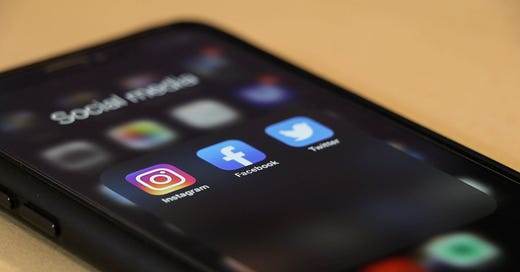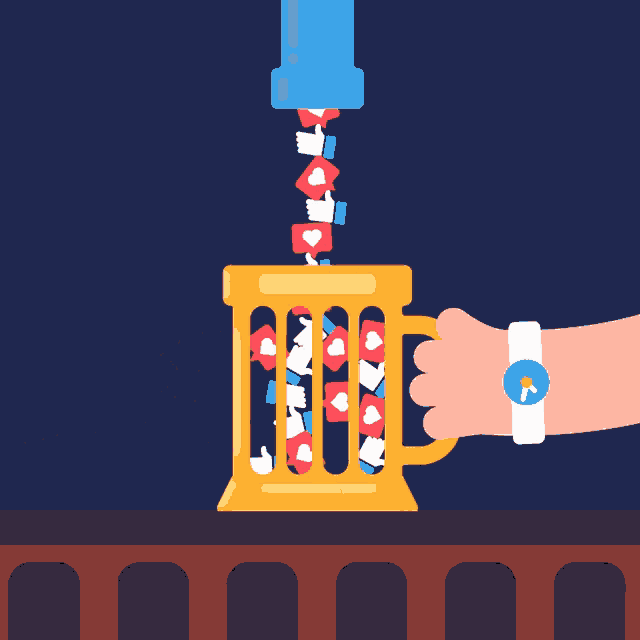Unlearning the Digital Dopamine Hit: Tackling Social Media Addiction
The digital dopamine hit.
There’s just something about posting and getting instant gratification that is so fulfilling. A share there, a like here, a retweet or two.
What a rush.
The rush was so potent that, around a year ago, I decided to go cold turkey on it. I hated the fact that social media had so much power over me and my self-perception. In typical all or nothing style, I cut the source off completely.
My previous social media fasts lasted about a week. This time, it was two months. No Twitter, Instagram, no Facebook, no nothing. For two months. Whatsapp was permissible to communicate, but beyond that—nothing.
The first month was weird. I felt small and unimportant, as I could no longer share with the world my thoughts through Twitter as they came. I didn’t feel cute — all my photos remained in my camera roll instead of Instagram. I had no idea what my peripheral old school mates were up to — I couldn’t stalk them on Facebook anymore.
But by the second month, I found myself adjusting very well. I picked up new habits I enjoyed and restarted old ones. I started to read and speak beginner French. I increased my strength in the gym much more quickly in two months than I had in six. I could focus and be present in conversations with my friends and family.
By the end of month two, I carried on to month three and I was having the time of my life. I had finally been liberated by the compulsion to interact with the semi-imagined online world. And damn. It felt good.
The Great Addiction: at What Cost?
Now, I know what you’re thinking.
Surely not another presumptuous think piece on the perils of social media.
Don’t get me wrong. I love social media, and I love some of the changes that have been spearheaded as a direct result of its explosion. The disestablishment of political authority and powerful media outlets, the decentralisation of knowledge and its acquisition, the rise of powerful global connections. You know, all the big picture stuff that goes in those stuffy articles…much like this one, wink.
But with great good comes the capacity for great evil.
And with the incredible amount of good that has come from social media…has equally come a pandora’s box of great ills. Social media has exacerbated social, ideological and institutional divides. It has fuelled crime and mental health concerns. And perhaps one of the most concerning impacts of social media?
It has fuelled the Great Addiction.
We’ve seen swathes of people addicted to the hits on social media. I’ve previously written an article on overcoming addiction more generally, but I wanted to touch specifically on social media as it’s such a pertinent and wide-ranging force facilitating addiction in the modern world.
What are the consequences of the Great Addiction, and how can you stay ahead of the curve?
Summary of Key Points:
Information Overload
Emotional and Psychological Consequences
Physical Consequences
Overcoming Your Urges
Information Overload
The speed at which we consume information online is far beyond our processing capabilities as humans. Information is great as it allows us to acquire more knowledge and potentially improve our communication skills. Knowledge is a form of power, and information is a way of amassing that.
However, once we start to consume information at a higher rate than we are capable of processing, it becomes quite difficult to enact the information in a meaningful way. Essentially, we become paralysed and stagnant - overwhelmed by the reality of information we cannot quite make a move on. Before we can do with what we have, we are plagued with more.
A great example is tragedy. Now, I’m not suggesting we censor tragedy and news stories which inform us of the great issues occurring in the world. However, constantly having access to stories of great tragedies not only causes desensitisation, but can also feed a sense of helplessness, inertia and lack of drive to do something to meaningfully contribute.
Emotional and Psychological Consequences
Unregulated and excessive use of social media can also greatly impact our mental and emotional wellbeing. There are many negative emotional and psychological consequences, that have been noted, such as anxiety, low self-esteem, stress, loneliness, and depression. These emotional and psychological consequences are non-exhaustive.
Social media is a hotbed for these emotions, and worse still is the impact it can have on your relationships and wellbeing in person.
Suddenly, you become more self-conscious, neurotic, insecure - your validation comes from strangers and half-friends on the internet. Suddenly, your relationships are so much less fulfilling - they don’t look the same as the bloggers online. Suddenly, you’re incapable of making deep, real connections - you’re too consumed in the mirages of perfection demonstrated online.
Do you know what the gag is?
Most of the things you see online will only ever demonstrate a portion of the full story.
We’re allowing ourselves to be emotionally and psychologically impacted by that which does not exist.
Physical Consequences
When using social media, many of us tend to be in sedentary positions. After all, it can be quite difficult to use Instagram when you’re sprinting, full pelt, for a new record. It might be just a bit trickier to post your thoughts on Twitter when you’re at the bottom of a squat. Even harder to post constant updates when you’re hiking a trail (although, there are definitely some folks who have managed to achieve such).
A sedentary lifestyle can lead to an increase in serious health risks, such as diabetes, high blood pressure, poor circulation, joint inflammation, and so much more. Overuse of social media can encourage being sedentary, as your focus is very much on using the platform at the time, and not on getting in the minimum amount of movement your body needs to thrive.
Overcoming Your Urges
All is not lost in the warfare against the online world. There are practical ways you can combat some of the negative impacts of social media. Here are a few things you might want to try this week:
Implement your daily social media boundaries: I personally try to stay off social media from 6am (when I wake up) until 12pm (when my Do Not Disturb function is disabled). It allows me to be fully present when I journal, workout, and generally take the mornings for myself. I then limit my usage again after 8pm. Generally, the evenings are the moments I have to indulge in a new episode on Netflix, spend time with the people I love, or just unwind after a long day. It’s important to decide and implement what your boundaries will be when it comes to social media.
Fasting is good for the soul: Sometimes, having intentional periods of fasting from social media are good mechanisms for resets. When you feel yourself moving further and further away from the best version of yourself, generally experiencing low moods when you go online, and your self-esteem waning - it’s time for some time away. You might do this intuitively, or preventatively. I like to take a full week or so off every quarter, just to reset and align myself closer with the reality of my life, my purpose, and my experiences.
Intentionality and purpose-led consumption: Part of the trouble of social media is knowing what is good for you. Being purpose-led in your consumption means you filter out what you see for your own good. You don’t follow accounts which may serve as negative triggers, or you ensure you only consume thoughtful, critical and wide-ranging content for specific purposes in mind. When you simply consume mindlessly, you leave yourself open and vulnerable to whatever happens to be floating around the internet at the time. Try to manipulate your algorithm by playing around with what you watch and listen to consistently.
Navigating social media addiction can be tough, especially when everyone wants to pretend that it isn’t a problem. It is. The problem will only continue to grow in proportion to our capacity to ignore it. My challenge to you this week is simple:
What will you do this week to overcome the Great Addiction?
I hope you enjoyed this week’s Optimise Me. I’ll see you again soon. Don’t forget to like or comment if anything here resonated with you - share with a friend too!
With love,
-RK
Resources
Audio
Visual
Reads






